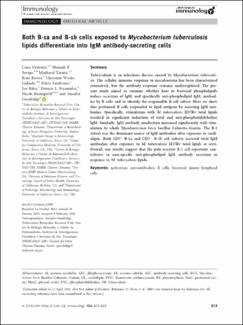Both B-1a and B-1b cells exposed to Mycobacterium tuberculosis lipids differentiate into IgM antibody-secreting cells

View/
Date
2018-02-08Author
Ordoñez, Ciara
Savage, Hannah P
Tarajia, Musharaf
Rivera, René
Weeks‐Galindo, Cheyenne
Sambrano, Dilcia
Riley, Lee
Fernandez, Patricia L
Baumgarth, Nicole
Goodridge, Amador
Metadata
Show full item recordAbstract
Tuberculosis is an infectious disease caused by Mycobacterium tuberculosis. The cellular immune response to mycobacteria has been characterized extensively, but the antibody response remains underexplored. The present study aimed to examine whether host or bacterial phospholipids induce secretion of IgM, and specifically anti-phospholipid IgM, antibodies by B cells and to identify the responsible B-cell subset. Here we show that peritoneal B cells responded to lipid antigens by secreting IgM antibodies. Specifically, stimulation with M. tuberculosis H37Rv total lipids resulted in significant induction of total and anti-phosphatidylcholine IgM. Similarly, IgM antibody production increased significantly with stimulation by whole Mycobacterium bovis bacillus Calmette–Guerin. The B-1 subset was the dominant source of IgM antibodies after exposure to cardiolipin. Both CD5+ B-1a and CD5 B-1b cell subsets secreted total IgM antibodies after exposure to M. tuberculosis H37Rv total lipids in vitro. Overall, our results suggest that the poly-reactive B-1 cell repertoire contributes to non-specific anti-phospholipid IgM antibody secretion in response to M. tuberculosis lipids.
